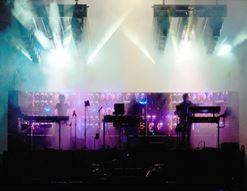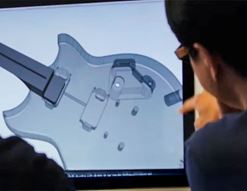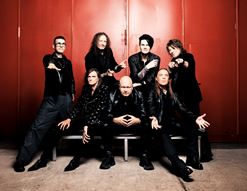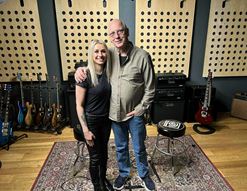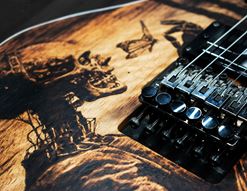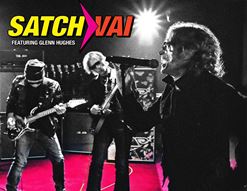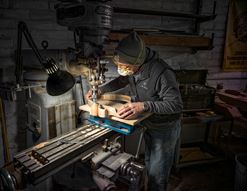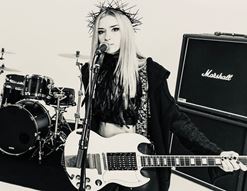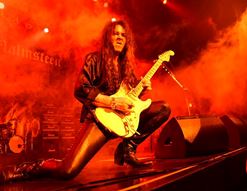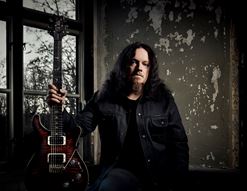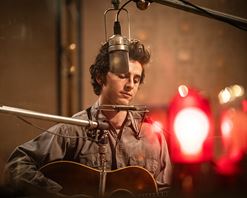So many questions.
There were so many things I wanted to chat to Steven Wilson about. As one of the most intrinsically interesting and fearless creators of our times, Steven Wilson has pushed his music in directions that most simply can't. He has given us gigantic riff rock, atmospheric prog, epic synthscapes and off-kilter acoustic ballads, all shot through with his trademark sense of grandness, melancholia and melodic finesse. He's one of the finest writers in modern rock music, not to mention a fantastic producer and a great guitarist, even though, as I'll learn, he genuinely doesn't see himself as a 'guitar person' at all.
This type of irreverence to his own virtues is evident in his overall attitude. He's a super hard-working artist who doesn't read (or believe) much of his own press; he is a forward-thinking musician who is concerned that the guitar has been culturally held in check by hip hop's dominance, and he is a meticulous sonic architect who doesn't care so much about the tools as he does about the end result. In short, he's an appealingly contradictory man, and that only makes him more interesting still!

(Photo: Lasse Hoile)
I've wanted to talk to Steven for a good few years now, ever since I was turned on to his previous band, Porcupine Tree. Often described as 'the best band you've never heard of' (yawn), Porcupine Tree were in fact a pretty significant proposition, playing at the Royal Albert Hall and influencing not only their peers but also turning Wilson into a sort of 21st Century figurehead of Progressive music. It's a term he's not keen on, and in fact we do not dwell too much on that in our conversation, but it's a fact that his production work on Opeth's Blackwater Park was seen as a milestone, and his remastering of King Crimson's back catalogue (not to mention Yes and Steve Hackett) has brought him into the high regard of prog's most significant stars. His own work is held up as some of the greatest alternative rock of the last three decades, regardless of 'household name' status.
Earlier this year Steven Wilson released The Future Bites, his 6th solo album. Dealing with the paranoia, vacuousness and narcissism of today's society, The Future Bites allows intricately textured synths take centre stage instead of Wilson's famous guitar textures. Synths have actually always played a significant part in his creative vision, but never to this level! The album, released in January (after being delayed from last Summer due to the pandemic), has been a critical and commercial hit, and it is the main focus of our conversation. Having said that, we touch on absolutely loads of areas, from William Gibson novels to bricks as art; from playing guitar parts 'in character' to appreciating your audience. In an hour-long conversation, we covered everything I hoped to and a lot more. Steven was, as I'd hoped, a perfectly lovely person to talk to: he provided enormous answers, punctuated with laughs and asides as he swerved around numerous topics before returning to his point. It was such an enjoyable conversation to be a part of, so I've decided to present it here with only the barest of edits, mainly for ease of readability. Here, then, is our full conversation.
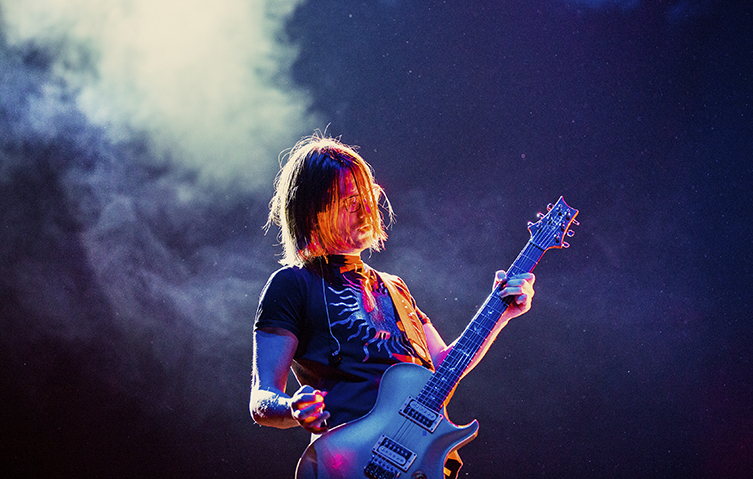
(Photo: Hajo Mueller)
Contents
Steven Wilson Interview
GG: So, the first thing I wanted to ask was about the reception of The Future Bites. Every time you bring out a new album, you have your loyal fanbase who don’t want you to change your sound too much. This one is relatively synth-based and poppy, and some fans were initially sceptical at the first singles. Then the album was released and has been reviewed exceptionally well, and it seems you have won over the sceptics. Is that how it feels to you, now that it’s been out for a couple of months?
SW: Um, that’s a very good question! I think the first thing I should say to that is that I’m not really aware, very often, of any of what you’ve just said. I mean, I’m aware that the press was great, but in terms of the long-term listeners – I don’t wanna call them ‘fans’, because I always find that a slightly patronising term (laughs) – but the long-term listeners: I kind of go out of my way to avoid that stuff, that noise. Partly because of what you said: I think there’s a tendency, always, for us as a species, to be initially quite resistant to change. But I’ve always found that, certainly in musical terms, the artist that I admire that most, the artists that I think have become the most legendary – and I certainly don’t want to put myself in that category – but people who would’ve been icons to me are the artists who continually confront the expectations of their audience. I think immediately of people like Bowie of course, but also artists like Neil Young, Bob Dylan, and even The Beatles to an extent.

(Photo: Lasse Hoile)
When you think of the rate of change that The Beatles went through in an incredibly short period of time – eight years – that’s how long it takes for most artists to make one album now! So, you think, the whole of The Beatles’ career was compressed into eight years, and look at the incredible rate of change that they went through. But of course, the elephant in the room is that none of those artists were operating in the time of social media.
Social media provides this immediate wave of feedback. I mean, literally within sixty seconds, sixty seconds of me posting a new song, or a new video or anything, I will have a response to that. And a lot of that will be negative. A lot of it will be positive too, but by definition, quite a lot of it will be negative because you can’t possibly make up your mind about something until you’ve lived with it for a while. Unfortunately, social media promotes this immediate, kneejerk response and like I say, most of the artists that I really admire were constantly confronting my expectations. And of course, I wasn’t sure, the first time I heard something different from them, but you learn to love it and you learn to appreciate the artist even more because they have not done what you’ve expected them to do, but you’ve ended up falling in love with it any way. That’s a very long answer to your question!
The best way I can describe it is, if we used to be a species that would gaze out at the universe with a sense of curiosity and wonder, now we spend most of our time gazing at our phones, to see ourselves reflected back through the eyes of other people.
GG: Not at all, that was a great answer. I was thinking about the themes you deal with on The Future Bites, so this dovetails in quite nicely. In terms of what you said about social media reactions, it seems that people are falling over themselves to be amongst the first to have a public opinion, Like, ‘Quick, I must have a reaction to this and then I must post it because it says something about me and my identity and I need this to exist!’
SW: Yes.
GG: Thematically, on a song like ‘Self’, is that what you’re getting at? That social media could be really useful but instead, it’s getting turned backwards to become all about people’s vanity, insecurity and need for validation?
SW: Yeah, I think ‘Self’ is a fundamental song on the record lyrically, certainly from the point of view that it is, as you kind of pointed out, about the theme of how the sense of identity has changed in the age of social media. The best way I can describe it is, if we used to be a species that would gaze out at the universe with a sense of curiosity and wonder, now we spend most of our time gazing at our phones, to see ourselves reflected back through the eyes of other people. That’s created a generation with a new sense of narcissism and self-obsession where we’re no longer really interested in listening to what other people have to say. We’re only interested in forcing our own opinion through.
And when you look at a lot of posts on social media – and as I say, I don’t look at a lot of posts on my page, I can only imagine (laughs) – but looking at some of the ones on other people’s pages, the amount of belligerence that I see, to the point where people have no ear for anything else but their own opinion, their own thoughts. And we also have, a lot of the time, this kind of extreme of reaction. For example, if you go on amazon and look at reviews of an album that’s perhaps a little bit divisive and controversial, you’ll probably see a whole bunch of one-star reviews and a whole bunch of five-star reviews. There won’t be much in between. I think that’s what happens when you have people trying to make themselves heard above the noise: wanting to stand out. To have their opinion validated is to express it in the most extreme, belligerent terms, to get noticed in that sense.
Unfortunately, the internet does play into that a lot and it takes a great deal of willpower to ignore that, but I do, I ignore it all! The only thing I’m really aware of is the press reviews, which were phenomenal! The best I’ve ever had in my career, which is amazing! But I’m also aware that its quite a divisive record, and I’m sure there are some people who’ve really taken against it, but I take that as a good thing: a badge of honour, almost. It means I’ve changed, and I can’t expect to take everyone with me on the journey, if you like.
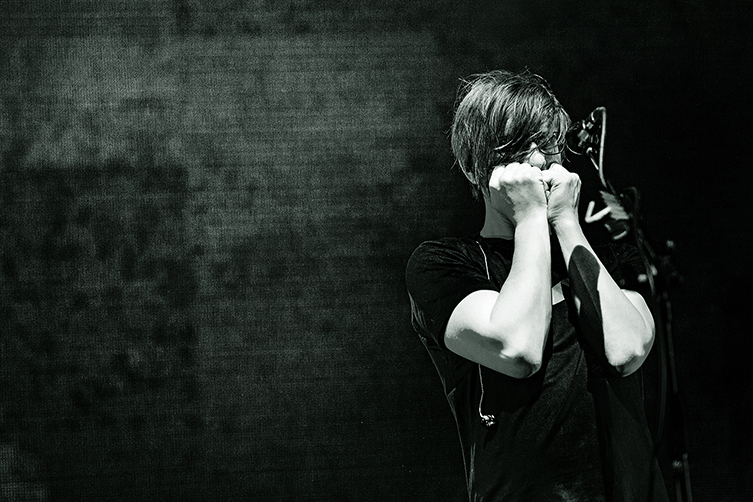
(Photo: Hajo Mueller)
Sci-Fi Premonitions
GG: Sure. Now, given that you’ve changed sonically and stylistically throughout your career, could it still be said that The Future Bites is something of a spiritual successor to (Porcupine Tree album) Fear of a Blank Planet?
SW: In some ways, I mean, musically it’s obviously quite different: Fear of a Blank Planet is probably the most guitar-orientated album I’ve ever done, and Future Bites is probably the least guitar orientated (laughs), but yes, I think you’re right. In fact, it goes back further than that! I remember writing a song in the 90s called Every Home is Wired (on the PT album Signify – Ray) and that was about the advert of the internet being central to everyone’s lives. I felt some uneasiness about that even at that time, which was 1995 or something like that.
GG: Wow, okay!
SW: So, it’s been a constant...I think one of the things, if you look through my lyrics over the years, one thing you’ll find that comes up time and time again is this idea of technology changing the course of human evolution. One of the things that’s really fascinating to me is, I grew up reading a lot of science fiction books. A lot of the great ones were written in the fifties and sixties by people like Isaac Asimov, Arthur C Clarke, Philip K Dick and Thomas Disch. If you read those books, a lot of them are about their fear s of how artificial intelligence would one day enslave the human race. It’s funny now, looking at it from the point of view of 2021, because the only thing they got wrong (laughs), was they imagined this artificial intelligence would be like robots that looked like us, walking around.

(Photo: Hajo Mueller)
GG: That’s right.
SW: Of course, the only difference is, the artificial intelligence is a kind of virtual intelligence inside the internet. Actually, what they predicted would happen has happened: we have largely become slaves to artificial intelligence, to the kind of algorithms that, on a daily basis, are analysing our patterns of behaviour on the internet and controlling our world, in a sense.
GG: Uh-huh, yes, absolutely.
SW: So, it’s fascinating for me to see this happening in an almost more... insidious way because it’s more invisible, it’s less obvious. But actually, that is what’s happened and that is a common theme through a lot of my lyrics over the last 25-30 years, this idea that one day, our course of evolution will be knocked off by technology and I totally, totally believe that’s what’s happened.
"I think if you look through my lyrics over the years, one thing you’ll find that comes up time and time again is this idea of technology changing the course of human evolution."
GG: That’s really interesting that you bring that particular element of it in with the sci-fi fiction because one of my specific questions I wanted to ask was whether there was a ‘speculative’ element to, well, I was going to say The Future Bites, but you’ve expanded that more broadly with your whole career. We might just have different reading habits but I was picking up on people like William Gibson and JG Ballard, and the notion that sci-fi writers use the future to talk about the present. I was wondering if The Future Bites isn’t really about the future at all: it’s about right now, isn’t it?
SW: Absolutely. But when I was writing it, which was in 2018, sort of around that time, we were right in the middle of the Brexit thing, we were right in the middle of the Trump administration, and I wasn’t optimistic for the future. For the first time in my life, I wasn’t particularly looking forward to the future. I’m happy to say that, certainly with the Trump thing, things have turned out better than I’d hoped. With Brexit, I’m afraid they’ve turned out even worse than I expected. So, there was definitely a sense that the future, at that point, was something which I was concerned about, and I think rightfully so.

(Photo: Lasse Hoile)
It’s funny that you mention William Gibson because one of the themes that’s obviously central to the Future Bites presentation is this idea of, you know, high-concept, high-designer aesthetics: packaging something as if it’s a product. Packaging a piece of music as if it’s kind of like an iPhone.
GG: Uh-huh.
SW: Or a high concept pair of sneakers or something like that. If you’ve read books like Pattern Recognition by William Gibson, which you probably have if you’re a fan, you’ll know that definitely deals a lot with those kinds of things: that brands and logo almost become more important than the things they are attached to. And we certainly have a lot of that in society as well now, where ownership becomes almost more important than utility. So, people will want to own something, simply because it’s got the right logo. Or, it’s got the right serial number or limited edition number on it. And they won’t ever use it! They won’t ever wear it if it’s a pair of sneakers, because they’re too precious to wear (laughs). The classic example of that is the Virgil Abloh brick, the limited-edition brick with the serial number, you know?
GG: Yes, of course! Haha!
"I don’t underestimate how unusual and rare it is to have that privilege: to be able to confront expectation."
SW: It sold for hundreds of dollars: it’s just a brick! (laughs) But it happens to have a limited-edition serial number on it. It’s been designed by Virgil Abloh. I’m fascinated by these things. Part of me thinks it’s a lot of fun, but part of me wonders what the hell’s going on with the human race, you know? (laughs) It’s just so, so beyond the realms of my understanding, but I’m fascinated with it at the same time. So, all of those themes – which you’re right, people like William Gibson and JG Ballard have been talking about those things for decades – in a way, it’s the beautiful thing about science fiction, it’s almost like a prediction of the future. Very often, they’re spot on, aren’t they?
GG: Haha, yeah, increasingly so! With something like that – the brick, I mean – there isn’t an intrinsic value to it, it’s an agreed value of the brand. And of course, with Pattern Recognition, the main character has an aversion to brands and that’s why she’s significant, but with that kind of idea of value, do you think maybe some people are afraid of being ‘caught out’, about not knowing something? Like, if it’s limited edition and I get it, that means I then have the implied value that’s attached to it?
SW: Oh, absolutely! I think that’s a big part of it. There’s so much elitism and snobbery, perhaps in a good sense though – and in a bad sense! – involved in this whole concept. I’ve always tried, with my limited editions and boxed sets and all this stuff, I’ve always tried to give real value for money, so I know if someone’s going to buy something that’s a premium price, and is limited edition, I always try to stuff it with content. Then, on the other hand, you see some other artists who, you know, the limited edition is just full of air.
GG: Oh yeah.
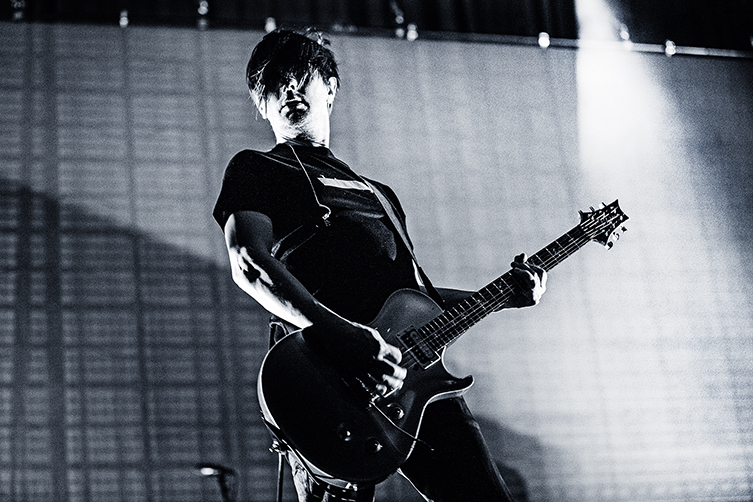
(Photo: Hajo Mueller)
SW: I mean, full of bullshit that no one is really gonna look at or use, but it’s also implied value. And you’re right, I think of lot of times, a lot of those artists rely on the fans, or the listeners, feeling like they are completists, so they have to have it because they have everything else by the artist, or just, like you say, this fear that they’re gonna miss out on either an investment because one of the worst things for people is when they decide not to buy a boxed set or something, and then the next month it’s sold out and going for a thousand dollars on eBay and it’s like ‘Shit! I should’ve bought one!’ (laughs) Just as an investment! There’s that whole thing about not wanting to miss out on something that might turn out to be a great investment and I think a lot of the Virgil Abloh thing is to do with that, you know? It’s true, those bricks now sell for ten times what they cost. And the other thing, of course, is just the almost automatic, random thing of ‘I must own this because it’s an artist I follow’.
GG: Uh-huh.
SW: And to be fair, I rely on that as much as every artist does. You do spend a lot of your career building – and again this comes back to the whole Future Bites concept – you spend a lot of your life building a brand that you hope people can trust and will stick with and buy into. Part of me obviously uses that because I don’t tend to give people what they want or expect. The only reason I can do that is because I know I have the ear of people to listen and they will perhaps - most of them, not all of them, as we’ve discussed (laughs) – but most of them will give me the benefit of the doubt. They will listen more than once, even if they don’t like it the first time. So, I find myself in this very privileged position of being able to change and do the last thing that people expect because I also know that people have bought into my brand and they have loyalty to this brand of ‘Steven Wilson’ or whatever it is. They will at least try to like it and try to understand, and that’s a beautiful position to be in. I don’t underestimate how unusual and rare it is to have that privilege: to be able to confront expectation. So again, that’s all tied into that idea of building your brand, yeah.
Brexit
GG: It is, yes. It’s more like the brand of ‘Steven Wilson' represents a certain level of quality rather than a certain type of sound. You know, if someone had only ever heard Deadwing and then the listened to The Futures Bites, they might be perplexed, but they’d still understand that it’s the same writer, probably. Now, earlier on you mentioned Brexit. Now, you’ve just had to pull your tour for the second time due to the pandemic. That’s already bad enough for you, but on top of that, there are all of these new Brexit laws, rules and regulations imposed on touring bands from both inside and outside the UK. How is all that stuff looking for you?
SW: Yeah, I mean, we didn’t get too far into it, because we never got as far as actually starting to book flights, travels, visas and all that stuff but it was on the horizon, and it was a very scary and daunting thing. I mean, I wouldn’t have had to deal with it, my tour manager would have had to deal with it, but I would’ve ended up paying for it all (laughs). So, having to apply for visas, having to pay for import duty just to be able to take a few boxes of t-shirts into France or Germany...having to suddenly now look into filling in customs forms and declarations and paying import duty and export duty, you get to the point where you think: what’s the fucking point? It’s too much trouble. It’s so much administration, and so expensive, just to go and play a show in Paris, which, God knows, is nearer to me now than I am to you! (laughs) I’m assuming you’re in Scotland.
GG: Yeah, I’m in Glasgow!
SW: Yeah, so Paris is nearer to me than Glasgow and yet it’s harder for me to play in Paris, to the nth degree, than it is to come and play in Glasgow. That’s ridiculous, and it does get to the point where you start thinking to yourself, is it really worth all the trouble to just do this? I mean, obviously, yes it is, when you’re up on stage and you’re playing for your audiences, it does feel like it’s worth it but I’m getting older and I want my career to become easier, not harder (laughs), you know! Even though I make it harder for myself in the sense of the records that I make, but certainly in terms of touring, I want it to become less arduous, not more arduous, so there was that other prospect, definitely.
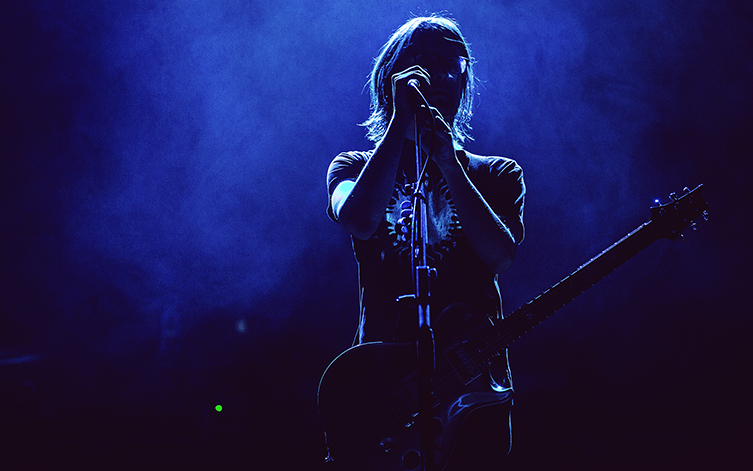
(Photo: Hajo Mueller)
The main thing is that I couldn’t put together a proper tour. I could’ve played the UK shows, touch wood I could’ve played the UK shows, but I couldn’t then have gone on and played Germany, France, Holland and Italy. Without those shows, my tour would’ve been a financial disaster. Most of my expenses, certainly 50% of them, are set up: creating all the video material, creating the production, booking the musicians’ rehearsals...and to do all that just to play 5 shows in the UK obviously wouldn’t have make sense for me. It’s heartbreaking, particularly since Future Bites is such a strong concept, one of the strongest ones I’ve ever had. Visually, it suggested so many things for a live production, and so it’s heartbreaking for me to have to let all that go. Well, hopefully only temporarily: hopefully, I’ll still come back to those themes whenever I tour next.
An Electronic World
GG: Yeah, hopefully so! It’s certainly a rich vein of creativity for you. Now, I’d like to talk about the writing process if I may? So, obviously you’re a guitar player and you also play keys and so on. The Future Bites is much more keyboard-heavy than some of your other records. Did you just happen to be in a mood where you just preferred sitting at a synth to picking up a guitar? Or did you specifically put the guitars away for a bit to see what else would happen?
SW: (brief pause) Yeah, it’s not as simple as answering that question so I’ll have to, as you can guess with me (laughs), it’s a bit more complicated than that. I think there were so many things that came into play there. You’re right, I think a lot of people think of me as a guitar player. I don’t think I ever identify as a guitar player. I’ve always thought of myself as a songwriter and a producer, someone who makes records, to be more simplistic about it. Whatever I needed to do, I would learn how to do it. So that would involve learning how to use, for example, computer recording technology, or how to program a drum machine, or how to play a bit of guitar or how to play a bit of piano. And I did all those things, but of course the reason why people identify me as a guitar player predominantly is because I became a guitar player in Porcupine Tree, almost by default because I couldn’t find a guitar player! I could find a bass player, drummer and keyboard player but I couldn’t find a guitar player, so I ended up playing that for myself. I could’ve easily played keyboard in that band, you know. It’s be a bit weird to think about that now (laughs).
But anyway, almost by definition, I became a guitar player. I’m not sure I identify as a guitar player because I’ve had some fantastic guitar players in my solo band, for example: what you might call ‘proper’ guitar players (laughs) and I see the love affair they have with their instrument. I see them every day, picking up their instrument and practising for two, three hours. I’m quite happy to not even touch a guitar for six months if I don’t need to! So that, for me, is a distinction I make between someone who thinks of themselves as a guitar player and someone who just uses it as part of their musical vocabulary, if you like, which is what I would think of myself as in that sense.
Never wanted to be a guitar hero, hate the shredding thing. You know, I think the guitar is something I approach like an idiot: I don’t know the names of most of the chords that I play! I recognise I have a style that’s kind of recognisable and I have some proficiency on the instrument, but I don’t really understand what I’m doing a lot of the time. I hope you’re not gonna ask me about pickups and string gauges and things because I have no idea about that stuff! (laughs) I’m not interested!
"I became increasingly aware over the last 5 years that there is something about the vocabulary of rock music that now belongs irretrievably to the second half of the 20th century."
So, that’s the first part of the answer to your question. There is a second part, and I apologise for the long answer! Um, why did the album become more about electronic music? Okay. I think I became increasingly aware over the last 5 years that there is something about the vocabulary of rock music that now belongs irretrievably to the second half of the 20th century. In the same way that rock n roll music came along in the fifties and kind of wiped out what was the popular pop culture music of the first half of the 20th century, which was big band jazz music, essentially. Glen Miller and so on. That was the pop music of the first half of the 20th century.

(Photo: Hajo Mueller)
Rock n roll came along in the fifties and became, no question, the dominant musical form of the second half of the 20th century. To me, it seems, what happened to big band music has now happened to rock music. Urban music and electronic music have essentially consigned the guitar-bass-drums form to part of history. And part of me thinks that’s the way it should be, because music is always evolving and always changing and that’s what’s exciting about it. Of course, part of me is also sad because I grew up in the tradition of rock music and I love rock music. So, it’s sad to me to see that musical vocabulary has failed to transition, in a way, into the 21st century. Urban music is completely dominant. I mean, I was saying to my friend last night, ‘when was the last time you heard a car pull up next to you at traffic lights or whatever, and anything other than hip hop came out the window?’ It could be a young, white Jewish kid or it could be a big Black dude, it doesn’t matter, it’s always hip hop! I never hear rock music coming out of cars anymore, and to me that’s significant. It reinforces what I’m saying here, which is that urban music has essentially become so dominant now that guitars don’t make a lot of sense to a younger generation: they’re not part of their world.
"I never hear rock music coming out of cars anymore, and to me that’s significant."
I was aware – finally I’m going to answer your question (laughs) – I was aware when I was writing The Future Bites, that the modern world was an electronic world. All of the sounds we hear around us, whether it’s coming from our laptops, our iPads, our phones, from the music we listen to, whatever it is we’re listening to, the sound that we’re predominantly surrounded by, 24/7, is electronic. Kids grow up in a world where they hear pretty much only electronic sound. And, no surprise then, that the music that they find the most relatable, is also from that world. It is electronic music. Guitars sound quaint, old fashioned and slightly strange to them! The Future Bites is a record about the ties we live in, as we’ve discussed, and therefore I wanted it to musically reflect the times we live in. So that’s why I made the decision that this record has to inhabit the world of electronic music. That’s a very long answer, I’m sorry, but I couldn’t answer it any simpler than that! (laughs)
GG: Long answers beat short answers ten times out of ten, so that’s fantastic, thank you! Now, there was something I picked up on and I don’t know if it’s on purpose or not, so I wanted to ask you about it. The music itself is, as we’ve discussed, very electronic, very synth-based. But see the vocal melodies? Loads of the vocal melodies are very old-school Blues. Very pentatonic. Would you agree with that?
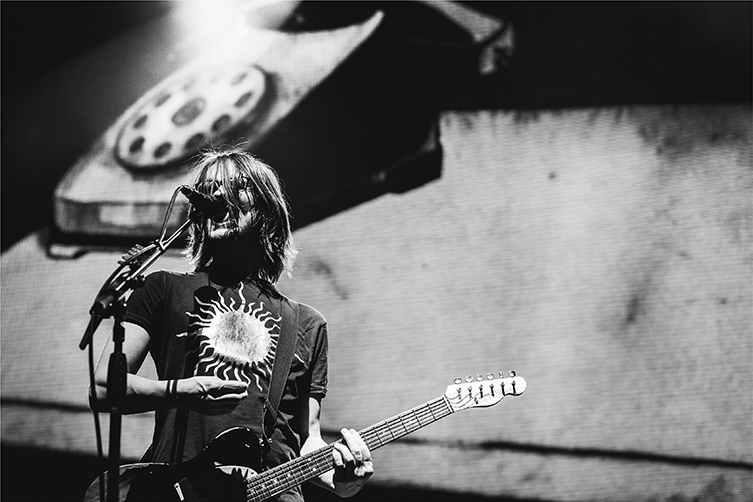
(Photo: Hajo Mueller)
SW: I would, but again, that’s a hallmark of a lot of modern, Urban music. The kind of ‘soul’ voice, or as you say, the pentatonic scale is very dominant in modern pop music. But I know what you mean, because if you listen to a song like Eminent Sleaze, it’s essentially almost like an old blues, it’s got a funky, sleazy, bluesy vibe to it, yeah.
GG: Yeah, and I was thinking about the juxtaposition of what we could term as 21st century, glittery synth music and then one of the oldest popular forms of music that we have available to us. That, to me, is a really interesting statement to have.
SW: Interesting! You know what? That had not occurred to me, but I think you’re right. That could be just me, you know, betraying my roots in a different way (laughs), I mean, it didn’t feel self-conscious. Everything is very intuitive from the point of songwriting. Ummm...I dunno, interesting point! I’ll have to mull that over.
The Process
GG: So, in terms of the process then, would you create parts and layer than up on your computer and then just improvise melodies? Or do you go and sing at the keyboard? How did it work this time for you?
SW: Yeah, pretty much as you describe, really. I described my approach earlier in terms of guitars as being that of an idiot really and I think I was only being slightly tongue-in-cheek there because I think there’s something about songwriting that...I like to think that the best way to write a song is to – and I think it sounds very pretentious to say it, but I think it’s true – is to almost let the song come in a very intuitive, unconscious way. Not to try to set out to do anything in particular, although I do sometimes do that. Usually, I just sit down and mess about! You know, with a guitar or with a synthesizer. A lot of the songs on The Future Bites came from using arpeggiators on synthesizers. You can hear that very clearly on a song like King Ghost, which is pretty much based on the arpeggiator from the Prophet 5.
GG: Nice!
SW: Just playing around with the arpeggiator and thinking, ‘oh, this sounds nice!’, holding down single notes and letting the arpeggiator do all the work, you know! (laughs) But, you know, ‘here’s a nice progression’, and just letting the music come in a very intuitive, idiot-savant kind of way. I think, particularly with regard to synthesizers, which are not things I’ve spent a lot of time experimenting with over the years, I don’t really know what I’m doing, so it’s stumbling, almost, into finding things that I think are exciting and inspiring to me and suggest vocal melodies.
GG: Okay, yeah, that’s a really interesting answer. You mentioned the Prophet V: was it a mixture of hardware keyboards and plugins for you? And did you have any particular favourites?
SW: When I was writing it, I was using a lot of plugins, but my co-producer, David Kosten, is a massive analogue synth purist, so the first thing he would do would be to throw out all of my plugins and virtual instruments. We ended up using almost entirely analogue keyboards. Sol the Prophet V, we used his ARP 2600 a lot, for a lot of the arpeggiators. We used his Minimoog, his VCS3, real old-school. Actually, that belongs to Tim from Keane, but it was permanently parked in David’s studio at the time because he was producing Keane, so we were able to use that. With his permission, I should add! (laughs) Yeah, using a lot of predominantly analogue keyboards and it’s not out of a sense of purism on my part, but there’s certainly something more inspiring about working with things that are unpredictable in that sense.
Guitar Talk
GG: Mm, yeah, that’s a bit of a ‘hall of fame’ of keyboards, there! That was almost all of the most lusted after synths in the world there, so good effort! So, let’s talk guitars! And bearing in mind everything you’ve said on your own perspective of yourself as a guitar player, I’m going to have to respectfully disagree with you on that! Not only do you have a discernible, recognisable style, you are one of the better modern day rock guitarists out there! That’s whether you like it or not, I’m afraid, Steven! (Steven laughs somewhat reluctantly) Not many people go both as for into the riffs and simultaneously into clean stuff and atmospheres, as well as solos. You don’t like shredding but you’re still not afraid of guitar solos, so I think you are on the map as a guitarist, and I think you should be happy about that, because it’s a good thing to be!

(Photo: Hajo Mueller)
SW: Thank you.
GG: Hahaha! When you made To the Bone (Steven’s previous album – Ray), you’d gone from the PRS guitars to the Telecaster. This time round, was there something new or did you just grab those ones?
SW: No, it was all the ’63 Tele. I can’t think of anything that wasn’t played on the Tele. It’s interesting, you talked about solos and actually, there are... when I think about it, there’s actually quite a lot of guitar solos on this record! There’s one on Eminent Sleaze, there’s one on Follower, there’s one on Personal Shopper, there’s one on 12 Things I Forgot. There are a lot of guitar solos on this record! (laughs) At least 4 or 5 across the 9 tracks. But none of them are what you might call traditional guitar solos. It’s almost like trying to approach the guitar in the form of a character. Now, this is something I’ve talked about before and I want to talk about it with you because I think it’s really important on this record particularly.
There’s a very big difference between hiring a guitar player – someone extraordinary as I have done, like Guthrie Govan or Dave Kilminster or Alex Hutchings – hiring a guitar player to play a solo on your track and playing it yourself as the songwriter. What is the difference? I’ll tell you what I think the difference is. The guitar player comes in and they listen to the music. The songwriter comes in and they respond more to the lyrics than the music. When I mean by that is, if I take a solo like Eminent Sleaze as an example, that solo, which is very angular, very choppy and very atonal, is me in the form of the character, in the guise of the character in the song. He’s a very sleazy, unreliable, insidious person. It’s me as that character, thinking, ‘How would this character play that guitar solo?’ And that’s a completely different mentality to the mentality that somebody like Guthrie or Alex would have, coming to play the solo on that song. Do you see what I mean?
GG: I do.
SW: That, to me, is the fascinating thing about being the songwriter and being the soloist as well. I’m really proud of that solo, but fuck knows what I’m doing! I don’t know! I don’t know what I’m doing (laughs). It’s almost like I’m not sure what I’m doing because I’m allowing myself to inhabit the character and play the solo in the form of that character. It’s the same on Personal Shopper: another very odd solo; and the same on Follower, a very angular, atonal solo, which was actually played on acoustic guitar, that solo.
GG: Oh?
SW: Yeah, put through an amplifier and my pedalboard, but again, it’s almost like finding ways to reinvent the notion of the classic rock guitar solo. And doing it more perhaps by referring to the lyrics than to the music, if that makes sense.
GG: It does, it does! You’re like a Method guitarist. You’re the Marlon Brando of guitar players now!
SW: There you go, yeah, yeah! (laughs) It’s a good way of putting it, yeah. I wish I’d thought of that, now. I’ll steal that and use it in my next interview now!
GG: Yeah, haha! The angular solo on Eminent Sleaze is one that I really wanted to ask you about as well! I really love guitar playing like Robert Fripp’s playing in Fashion, the David Bowie song.
SW: Yeah.

(Photo: Lasse Hoile)
GG: It’s so noisy and amazing, it really doesn’t belong on any pop hit single, you know? That type of solo on Eminent Sleaze follows a similar notion: it’s like a little moment of Jackson Pollock-style art instead of how fantastic players like Guthrie Govan may see things, like ‘here’s a chord chart, how do I get from A to B?’. It’s a whole different thing.
SW: Mm, yeah.
GG: So, I was gonna ask you how you played, haha! Now there’s no point because you don’t know!
SW: Honestly, I don’t! I don’t know what I did! I kind of put my fingers into random shapes that created ugly...tritone, is that the expression?
GG: Yup!
SW: Horrible intervals. And I think you’re absolutely right to kind of invoke Robert because Robert is kind of the poster child, in a way, for the unexpected approach to guitar solos. I think a lot of it is also down to the fact that – and he’d be the first to admit it – he’s not a natural guitar player, and I don’t think I am either in some respects. When you’re not a natural guitar player, I think you tend to approach guitar in a very different way. You’re not thinking about scales, and what would be the quote-unquote right thing to do, as you say, to get from A to B. I don’t have any of that. My brain doesn’t think fast enough to do that. So, it’s this very sort of primal kind of reaction to the song and the lyrics, and I’m just throwing my fingers onto the guitar in a very kind of intuitive way.
It’s funny, there’s an Italian guitarist who’s learned that solo. She’s called Maria Barbieri, an amazing guitar player. She’s transcribed that guitar solo and she can play it exactly: I could never play it again! (laughs) Never! It’s amazing to see someone else transcribe it. She could probably tell you what I’m doing better than I could.

(Photo: Hajo Mueller)
GG: Haha, cool, I’ll give her a shout, to keep us both right!
SW: She’s an amazing player.
GG: That’s great! I’d like to talk to you about sounds as well. Last time you came to Glasgow, I was at the show and your live guitar sound is exceptionally good, and that’s from the point of view of a gigging player. Getting good tone live isn’t all that easy when you’re playing with volume because it kind of changes everything. What I was going to ask was – and this may be as simple as ‘buy great equipment’ – but do you have any tips for getting a great live sound?
SW: I use a Bad Cat amp which has a clean and a dirty channel. It’s pretty much as simple as that: it’s a fantastic amp, I’m sure you know the Bad Cat amps?
GG: I do.
SW: And I have a beautiful pedalboard. I was gonna say, there’s a very facetious answer to your question, but I’ll say it anyway (laughs): How do you get such a great sound? You call up Daniel Steinhardt at Gig Rig! He is my guru. I don’t have the time to go out and investigate what the greatest pedals are. I use a lot of pedals so I need a tremolo pedal, a vibrato pedal, a Leslie simulator, a couple of different gain pedals. I need a phaser, a wah-wah, a delay, a reverb, and I don’t have time to and go all the research. And of course, those guys at the Pedal Show and Gig Rig, they’ve done all that! And also, Dan’s an amp purist as well, so he’ll tell me what the best amps are. He’s been very positive about Bad Cat over the years, which is why I stuck with them. So, Daniel is always my first port of call. I’ll say, ‘This is what I need to do, Daniel’, I’ll play him the record and say, ‘these are the sounds I need to create’ and he has just been so helpful over the years. I think I’m on my third generation of pedalboard that Daniel has built for me. But it’s always built with the Bat Cat dual channel amplifier in mind. It’s a beautiful amplifier, it just has an incredible tone to it.
GG: Okay, so it’s a case of it’ll sound nice however you EQ it or set it, so it’s just about how you prefer it.
SW: Well, I’ve simplified that: I do experiment a lot. For example, I have the option of going through the clean channel and obviously going through a distortion pedal and being able to then control delays and reverbs and things like that. But I’ve found over the years is that actually, what I love the most is putting delay and reverb into the gain channel.
GG: I was gonna ask you about this, Steven! Sorry to interrupt you.
SW: Yeah, go on.
GG: That particular sound, I wondered about this! Is this what we hear on tracks like Harmony Korine, when it all gets big towards the end which it’s kinda of End of the World Shoegaze?
SW: Mm-hmm.
GG: So, the reverb and delay goes into the preamp stage, and then you distort it?
SW: Yes. I love that, I absolutely love it. To me, it’s the most rock n roll thing ever (laughs). If you listen to Neil Young playing a solo on something like Cortez the Killer or Like a Hurricane, that’s what you’re hearing. You’re hearing him putting his guitar into a reverb and then into an amp with a lot of gain on it. And so, you give this sense that the reverb is always trying to break through, and it’s being compressed down with the gain. Then you stop playing and get this big cloud of distorted, ugly reverb. But it’s so rock n roll! I love it! I don’t like that beautifully clean delay, it immediately says ‘80s’ to me, you know? I love rock n roll; I love things that sound a bit out of control. Again, coming back to the sort of aesthetic of the solos on the record, things like Eminent Sleaze and Personal Shopper, solos that almost sound like they’re on the verge of being out of control.
And also, that Follower solo; that’s an acoustic guitar that I can tell you when I was playing that, if I took my fingers off the strings for one minute, all I could hear was this wall of feedback. It was an acoustic guitar with a pickup on it, going through an incredible amount of gain! So it’s almost like you’re having to control this beast in your hands. Part of that for me is also not putting that delay and reverb in the loop so it’s all nice and clean, with a distortion pedal at the front: fuck that! (laughs) Put it all through the gain channel and have it just this mess that you have to control. This is so much cooler and so much more rock n roll. It’s what Jonny Greenwood does, it’s what Neil Young does, and it’s not what any of those shredders do. I can’t stand shredders.
GG: Haha! Also, it would transform your playing because instead of being like ‘check out my legato’, all of a sudden you’re, like, pulling your notes sharp so you can hear the delay react to the change, and you’re getting this sonic maelstrom happening. It’s so much more fun!
SW: Yeah! Yeah, you have got this crazy animal in your hand, rather than this thing that you’ve tamed, and yeah definitely, as you say, that completely makes you play in a different way. To me, that’s fundamental to my guitar tone. So, all of those guitar sounds and all of those solos on the record have the reverb and the delay as an intrinsic part of what’s going into the gain stage.
GG: Brilliant, I’m gonna try that.
SW: You’ll love it.
GG: Totally! And also, I remember Trent Reznor saying that he agonised over synth parts and sounds, but when it came to guitars, his attitude was: who cares what guitar it is? Just plug in a guitar! For him, the interface of the instrument itself, the hazards that can just happen, and even the sound of your hands on the strings, all give things that a keyboard can’t. All of these physical elements of the guitar are our strength as guitar players, that make the context of the guitar work against everything else.

(Photo: Hajo Mueller)
SW: That’s very interesting that you say that. I have to be very honest: I never cared much about guitars until I got my Tele (laughs). It’s really the only guitar I’ve ever seriously had a love affair with, mainly because I think it looks so cool, you know! But it also sounds great. What I love about Teles, and I talked about this when I did the To the Bone interview rounds, is the fact that the Tele doesn’t actually need a lot of gain on it to sound aggressive. It naturally is aggressive, so again, if you start putting that through your pedalboards, you’ve got so many colours and so many textures that you can create.
"What I love about Teles is the fact that the Tele doesn’t actually need a lot of gain on it to sound aggressive."
One of my favourite albums of all times is an album by XTC called Drums and Wires and it was this idea that they were making an album that was all about the sort of wiry sound of guitars, almost not distorted but aggressive nonetheless, the sound of wire. I’ve always loved that. Teles of course are the epitome of that, so yeah, I mean there’s something, and you’re absolutely right, I think this is one of the reasons people love analogue keyboards too, having said that: it’s the unpredictability of when you pick up a guitar. It almost doesn’t matter what you had in mind when you picked it up, it’ll give you something different to what you expected, but no less appealing. Sometimes even more appealing that what you’d imagine, and I find that with analogue keyboards, too. Because they are unreliable, they can give you something you didn’t expect.
It’s almost like if I could draw an analogy with working with other musicians, and it’s one of the things I’ve talked about: the idea of being a solo artist. The one thing that I’ve been able to do as a solo artist, which I wasn’t able to do within the context of a band, is bring in other musicians that I’ve never worked with before, to give me something I wasn’t expecting, but that I love anyway. That’s why Bowie was such a great reinventor of himself, because he was always changing the people he worked with. So he’s always the same, but the people around him are always changing and that made him look like he was always changing. He was, to an extent, changing too, but you know what I mean by that.
GG: I do.
SW: One of the beautiful things about being a solo artist is just being able to change from album to album. I mean, I’ve worked with different people again on this record: different producer, different drummer, and those things have enabled me to also sound like I’ve changed too.

(Photo: Lasse Hoile)
On the Horizon
GG: Yeah, yeah, absolutely. A fresh canvas. Now, we’re nearly done, but one thing I wanted to ask was: now that the tour has been moved back, presumably you now have a big window of available time. Are you working on new music at the moment? And if so, are there directions or concepts forming that you can share with us?
SW: Yeah, so because I’m not able to tour this year, or last year, you’re right: I have channelled that into being creative. I am working on a book now, which I’m just about to finish which is a book about everything. It’s got fiction in it, it’s got autobiography, it’s got my ideas about music, it’s got chapters about my relationship with my fans, it’s got chapters about what I see as the art of listening...all sorts, anything I could think of to write about, I kind of put it into the book. So that is something I’m finishing off.
I’m working on two albums. One of them, which will be out if not by the end of this year, then certainly early next year – which is a guitar record! – funnily enough, that’s not a solo record. That’s going to be a collaboration, but I can’t say who with at the moment. It’s much more of a guitar record. And then the following year, I wanna put out a proper follow up to The Future Bites, which I think will be the next logical step on, from Future Bites. Again, quite electronic, perhaps a bit more dour, a bit downbeat this time, a bit more melancholic than Future Bites was, but it’s early days so I can’t say that for sure. So yeah, trying to keep up the output in the absence of being able to tour.

(Photo: Hajo Mueller)
We continued talking for a few more minutes, discussing Steven's upcoming book and agreeing (hopefully) to speak again once his mysterious collaborative project is released. Talking with Steven was everything I hoped it would be: interesting, funny, involved and far-reaching. His brain moves at a hundred miles a minute, but he is careful never to leave you behind. Afterwards, I felt pleased that we'd covered so much ground, and charmed at having spent time with such a charismatic character. His upcoming book release sounds very promising, as does this new collaborative project. I have my suspicions as to who the mystery party may be, but I'll wait and find out like everyone else.
In the meantime, The Future Bites is out now on Caroline International records. Check out the dedicated Future Bites site and keep up with Steven via the official Steven Wilson website. We'd like to thank Steven for his time and generosity, and to Robin Turner for all of his help. As ever, thanks go out to you for stopping by and reading this article! We have many more interviews on the site, so be sure to click through to the guitarguitar interview pages for more like this.

